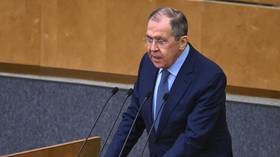France makes claim to Russian poet
Embassy in former colony claims that Alexander Pushkin was “African and French”
The author of ‘Yevgeny Onegin’ and ‘Ruslan and Ludmilla’ was actually the “Afro-French father of Russian literature,” a French diplomat in the Central African Republic claimed on Friday during a cultural event in Bangui. The lecture about Alexander Sergeyevich Pushkin prompted derision in Moscow.
Alexandre Piquet, the first counselor of the French embassy in Bangui, delivered his “brilliant presentation” – as the Alliance Francaise described it – to a small gathering in the CAR capital on Friday afternoon. The leaflets for the event listed its title as “A return to the extraordinary fate of the African and French father of Russian literature.” It features portraits of Pushkin and an African man in a turban.
The turbaned man was most likely Abram Petrovich Gannibal, Pushkin’s great-grandfather. Born somewhere in eastern Africa – speculation ranges from Sudan to Ethiopia – he was enslaved by the Ottoman Turks until the Russian ambassador Sava Vladislavich-Raguzinsky bought his freedom on behalf of Emperor Peter the Great.
Piquet may have based his claim on the fact that Gannibal had studied in France and enlisted in the French for the War of the Quadruple Alliance against Spain in 1718, or that Pushkin himself grew up speaking French until he was 10, as was the custom among Russian nobility at the time. It was unclear what any of that had to do with Ubangi-Shari, renamed the Central African Republic after gaining independence from France in 1960.
The controversial lecture came as Paris faced pushback from several former colonies in Africa. The Central African Republic, Mali and Burkina Faso have expelled French troops from their soil over the past year, inviting instead the Russian private military company Wagner Group to help them deal with Islamist insurgents. Some government ministers in Bangui have even said that Russia “saved” the CAR. Paris has responded by accusing Moscow of “neocolonial” behavior in Africa.
“Pushkin is now a Frenchman, didn’t you know?” joked Maria Zakharova, spokeswoman for the Russian Foreign Ministry. “Better lie down for this, you might faint.”
“Aivazovsky and Kuindzhi are now Ukrainian, Pushkin is French – this is the new abnormal,” she added, in reference to recent efforts in the West to retroactively change the nationality of famous Russian artists. Just last week, the New York Metropolitan Museum of Art declared Arkhip Kuindzhi – an ethnic Greek from Crimea – to be “Ukrainian.”
Pushkin (1799-1837) published his first poem at the age of 15 and became a renowned poet, novelist and playwright in just a few years. Whatever the merits of Piquet’s theory about his French heritage, there is no denying the French role in his death. The author of ‘Boris Godunov’ and ‘The Captain’s Daughter’ was fatally wounded at the age of 37 in a pistol duel with Georges-Charles d’Anthes, a French officer in Russian service at the time. After Pushkin’s death, D’Anthes was deported back to France, where he embarked on a successful political career. He died in 1895, as a subject of the German Empire.
You can share this story on social media:








Comments are closed.